
by Dharam CW2 | Apr 24, 2024 | PMI Certification Insights
Unlock the Power of PMI Certifications – A Gateway to Project Management Excellence!
🚀 Elevate Your Career with PMP®, PgMP®, and PfMP® Certifications

PMI Combined Active Certifications Holders Around the World
Are you aiming to elevate your expertise in project, program, and portfolio management? Here’s why holding the PMP®, PgMP®, and PfMP® certifications can be a game-changer for your career:
– 803 professionals hold PMP®, PgMP®, and PfMP® certifications

803 professionals hold PMP®, PgMP®, and PfMP® certifications
– 864 are certified in both PgMP® and PfMP®

864 are certified in both PgMP® and PfMP®
– 1506 have PMP® and PfMP® certifications

1506 have PMP® and PfMP® certifications
– 4733 professionals hold PMP® and PgMP® certifications

4733 professionals hold PMP® and PgMP® certifications

Dharam Singh
Why Combine Certifications?
Combining PMI certifications enhances your strategic capabilities across all project dimensions, providing a deep dive into the complex world of project management. This holistic understanding is crucial for:
– Broadening Professional Appeal
– Deepening Strategic Insights
🌟 Step Up & Join the Elite
– Demonstrate Leadership: Integrate your PMP®, PgMP®, and PfMP® credentials to showcase your leadership in project management.
– Community Engagement: Connect with a network of professionals dedicated to continual learning and growth.
📅 Don’t Miss Our Next Webinar!
– Join our upcoming PgMP®/PfMP® Success Story Webinar: https://bit.ly/3TSx8fj
Let’s Connect!
– Book a Free Consult: Unlock your project management potential with an obligation free personalized session at http://talktodharam.com
– Stay Updated: Subscribe to our https://bit.ly/2YF0wJl for the latest Q&A and certification success stories.
I Want to Hear from You!
What is the biggest challenge you’ve faced in project management and how could a PMI certification have changed the outcome? Share your experiences or career aspirations in the comments below.
For more insights and professional tips, follow me on LinkedIn!
Website – http://bit.ly/3KzwtuF
Facebook – https://bit.ly/3jQRTmV
Instagram – https://bit.ly/3h6xzMB
Twitter – http://bit.ly/3zB4Qv0
Pinterest – http://bit.ly/40H4Fdu
YouTube – https://bit.ly/2NDY8wd
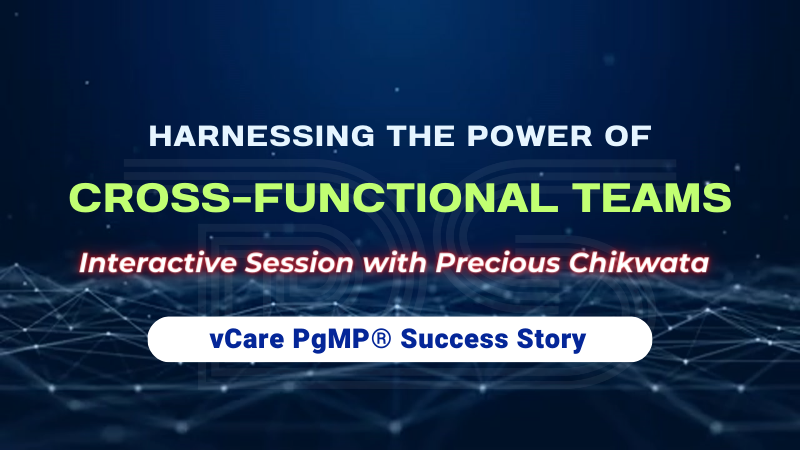
by Dharam CW2 | Mar 11, 2024 | Program Management
Join Precious Chikwata PMP®,MBA,PgMP®PgCert Cybersecurity and me for an insightful Q&A session as we explore the dynamics of cross-functional teams. Dive deep into the reality beyond the statistic that “75% of cross-functional teams are dysfunctional.” As seasoned Project/Program Managers, let’s discuss this figure, exchange experiences, and examine the essence of effective teamwork.
In this episode, we’ll also discuss how to navigate crises by building resilient networks of teams and the pivotal skills required for managing cross-functional teams and stakeholder expectations.
🔑 Highlights of the session include:
– Precious Chikwata’s personal PgMP journey
– Strategies to construct resilient teams during crises
– Debunking the myths of cross-functional team dysfunction
– Navigating stakeholder expectations within complex team structures
– Tactics to dismantle silos and enhance inter-team collaboration
– Resolving tough conflicts and extracting valuable lessons
– Essential skills for leading cross-functional teams as a Program Manager
– Managing expectations when program deadlines are at risk
– Utilizing PDUs effectively
– Tips for passing the exam
– Insights on rebounding from market challenges to secure your next role
Unlock these insights and enrich your knowledge by watching the full episode now: https://youtu.be/D3rzic6MbSg
🚀 Elevate Your Project Management Career:
– Register for my upcoming PgMP/PfMP Success Story Webinar: https://bit.ly/3ON2Ibl
– Book an obligation-free consultation session on Project management Career, training, and certifications: http://talktodharam.com
– Discover training offers and certification discounts: https://bit.ly/3jWVepD
– Stay updated with our Q&A series and certification success stories by subscribing to the vCare Project Management YouTube channel at https://bit.ly/2YF0wJl
– Follow my podcasts and interviews with Project Management Experts on YouTube at https://bit.ly/2NDY8wd
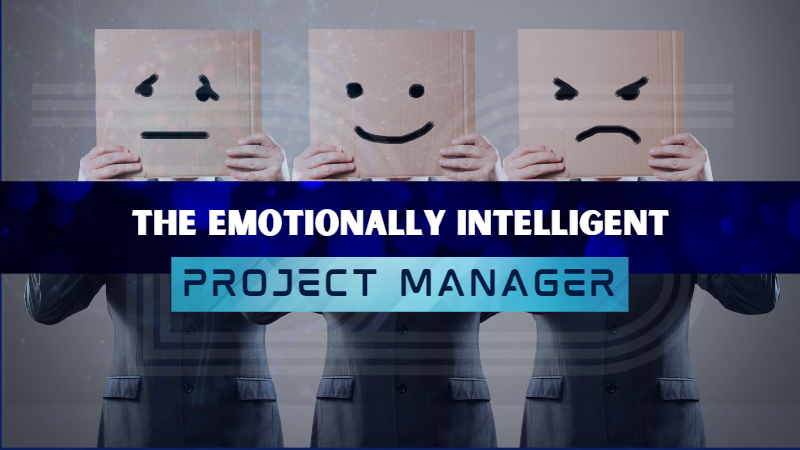
by Dharam CW2 | May 19, 2023 | General
Emotional intelligence in the workplace is becoming increasingly important for leaders and project managers as remote work became more prevalent due to the pandemic. Success in project management and managing cross-functional remote teams is only possible with emotional intelligence.
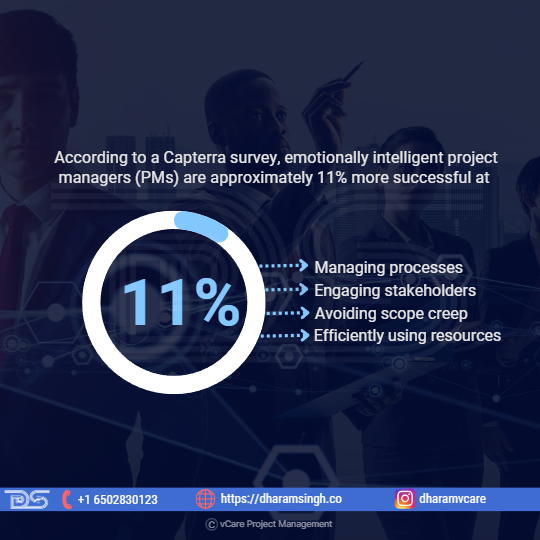
Capterra Survey
According to a Capterra survey, emotionally intelligent project managers (PMs) are approximately 11% more successful at managing processes, engaging stakeholders, avoiding scope creep, and efficiently using resources than PMs who lack this skill.
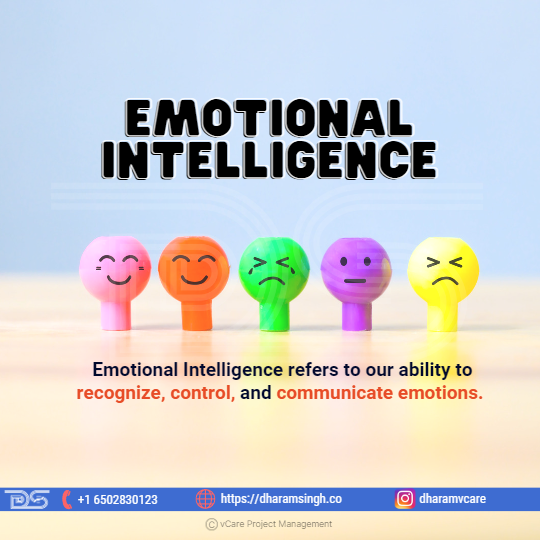
Emotional Intelligence
What is Emotional Intelligence?
Emotional intelligence refers to our ability to recognize, control, and communicate emotions. People with high emotional intelligence understand how they feel, what their feelings imply, and how their feelings affect others. In interpersonal situations, it is also the ability to empathize with others. Emotional intelligence is about creating a positive work environment, which is critical to the success of any project.
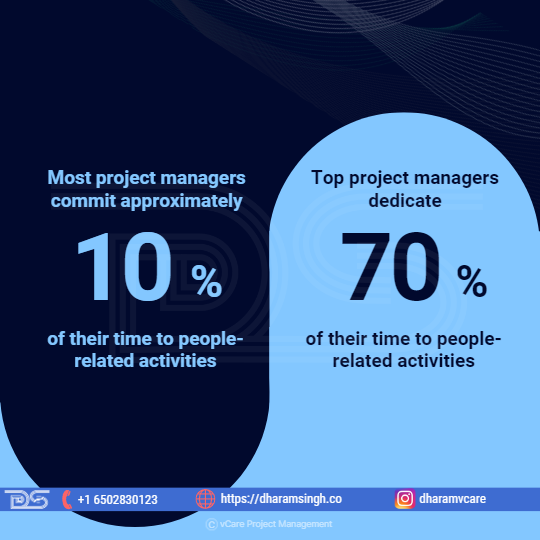
As Per LiquidPlanner Study
According to a LiquidPlanner study, most project managers commit approximately 10% of their time to people-related activities. Top project managers dedicate 70% of their time to these activities. As a result, we can conclude that emotional intelligence is crucial for project success.
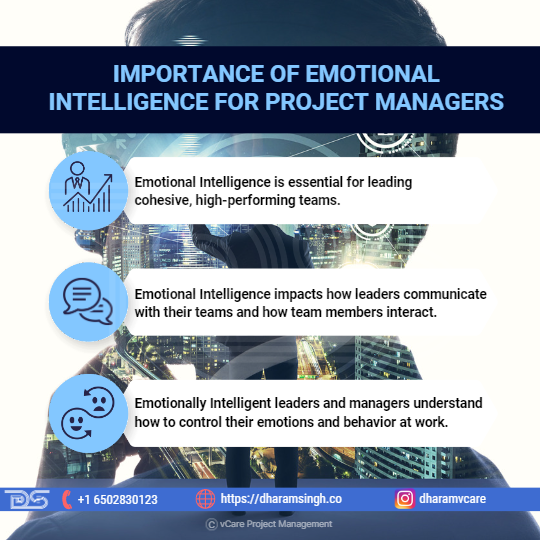
Importance of Emotional Intelligence for Project Managers
Importance of Emotional Intelligence for Project Managers
- Emotional intelligence is essential for leading cohesive, high-performing teams.
- According to researchers and behavioral scientists, Emotional intelligence impacts how leaders communicate with their teams and how team members interact.
- Emotionally intelligent leaders and managers understand how to control their emotions and behavior at work, which includes providing safe environments for exchanging ideas and feedback, productive teamwork and performance, good morale, employee engagement, and job satisfaction. They manage workplace stress and conflict with care and educate their team members to do the same.
Characteristics of Emotional Intelligence
What can project managers do to help themselves develop and become more aware? First, let’s examine five abilities for raising emotional intelligence:
- Self-Awareness – The ability to sense, identify, and comprehend emotions is self-awareness. Unfortunately, many of us were taught to ignore our emotions in the past. However, it is critical to be aware of your feelings to make appropriate decisions and act accordingly. Those with high self-awareness are self-assured, authentic, open to feedback, and capable of maintaining perspective throughout all project phases.
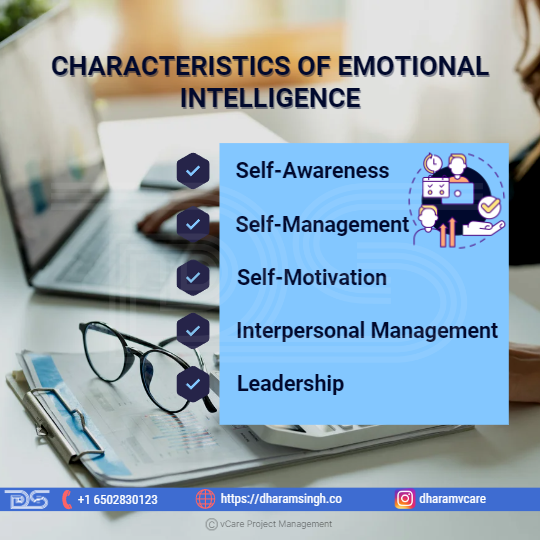
Characteristics of Emotional Intelligence
- Self-Management – Self-management is the ability to reason well while understanding feelings. Many frequently react based on their frame of reference rather than selecting a response based on their current unique circumstances. Self-managers are deliberate in decision-making, taking the initiative, framing events appropriately, maintaining perspective, and responding quickly. They understand their feelings and why they have them and effectively manage their responses.
- Self-Motivation – Self-motivation is the ability to channel the power of your emotions toward a specific goal. When project teams have a purpose, these ‘P’s follow peace, passion, power, perspective, and potential leverage. Self-motivators who are influential are optimistic and have a positive attitude. They can delay gratification and assert themselves.
- Interpersonal Management – The capability to identify and respond properly to the emotions of others is referred to as interpersonal management. If you can connect with people and acknowledge their humanity, they will answer openly, leading to common trust.
- Leadership – An emotionally intelligent project manager inspires guides, challenges, and supports the team. Leadership is defined as the ability to create and communicate vision and passion for assisting individuals and organizations in reaching their full potential.
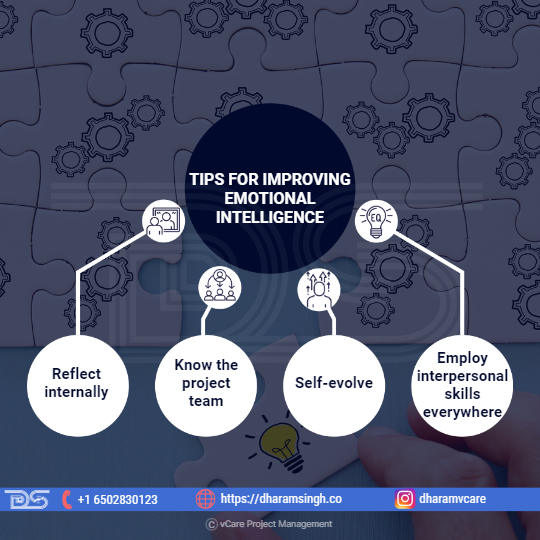
Tips for improving Emotional Intelligence
Tips for improving Emotional Intelligence
- Reflect internally – To become more emotionally aware, one must first understand their emotions and then regulate them in stressful situations. Next, they have to figure out what motivates them. Finally, authenticity is necessary to develop emotional intelligence by leading a successful project team and establishing meaningful relationships with stakeholders.
- Know the project team – Project managers are usually aware of the people they must contact when working on a project. However, understanding the project team, from team dynamics to personalities to dealing with conflict and stress, is just as important. To improve emotional intelligence, one must first get to know their team, communicate with them, and understand their emotions. It will also help the success of their project. This job becomes even more important for teams that operate in multiple locations and are diverse.
- Self-evolve – Along with other important leadership talents, project managers should work to improve their emotional intelligence regularly. Conditions surrounding a project frequently change; its scope may shift, the number of stakeholders may increase, and projects may eventually end.Every project is distinct, and no project manager can complete a project independently. Therefore, it is advantageous for project managers to consider what they learn during and after a project. For example, consider how a project team operated, what they witnessed during critical times with stakeholders, and their team’s performance.
- Employ interpersonal skills everywhere – Emotional intelligence can be helpful in almost any project management situation. For example, people may feel compelled to sign off on a strategy to minimize delays while managing scope changes or project risk. Following the resolution of such issues, an emotionally intelligent project manager would pursue people because they notice that this could lead to more severe problems in the future.
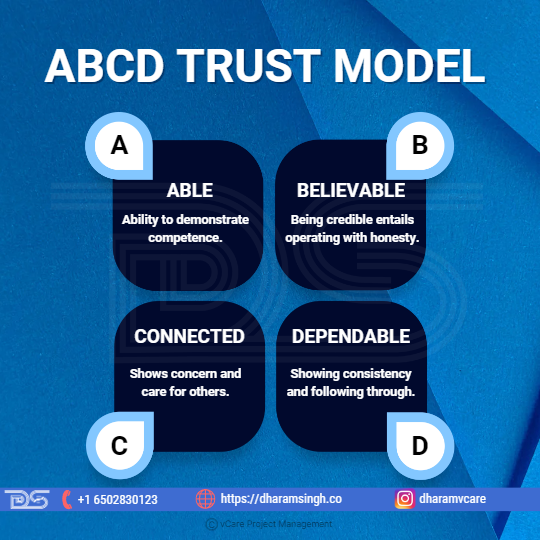
ABCD Trust model
ABCD Trust model
Better relationships will result in better outcomes. That is why developing trusted connections is critical to the success of your organization. When individuals trust one another, they may work efficiently together.
It is well known that low trust harms morale, productivity, and turnover. To prevent these traps, Ken Blanchard created the ABCD Trust Model to help executives understand the activities that affect creating trustworthy relationships.
Blanchard suggests four critical aspects for leaders to develop trust with people: Able, Believable, Connected, and Dependable.
- Able – The term able refers to the ability to demonstrate competence. Leaders demonstrate competence by possessing the necessary skills, education, credentials, and experience. They also exhibit their capacity to lead by accomplishing achievements. Able leaders can encourage people and collaborate with them to achieve goals.
- Believable – Being credible entails operating with honesty. Believable leaders adhere to a set of core beliefs. They know what they stand for and will not compromise their principles under pressure. Being credible also means maintaining promises and not lying or stretching the truth.
- Connected – Connected shows concern and care for others. This aspect fosters trust and contributes to a more engaged workplace atmosphere. Being linked entails attending to people’s needs and promoting their well-being. Leaders also build relationships by giving information not only about the organization but also about themselves. Employees are significantly more likely to provide their best effort when they feel linked to leaders.
- Dependable – Dependable means showing consistency and following through. It entails holding oneself and others accountable for commitments. A trustworthy leader will accept responsibility for their acts and help their followers face adversity.
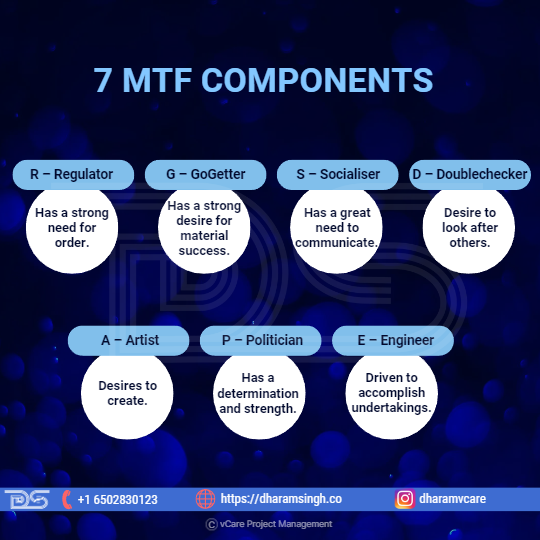
7MTF Components
7MTF Components
The 7MTF model is composed of seven components. We all have all 7 in our personalities; as adults, 2 to 4 will be strong, some will be weak, and others will be ordinary. This mix of elements is one of the most significant variables in deciding our temperament – our emotional predisposition.
- The R – Regulator (formerly known as the Normal) – A person with a ‘strong R’ has a strong need for Order. They will be mature, responsible, calm, and emotionless. You may hear the words ‘should,’ ‘ought,’ and ‘logical’ in their language. They have high expectations of themselves and others, including those with whom they live and work.
- The G – GoGetter (formerly known as the Hustler) – A person with a ‘strong G’ has a strong desire for material success. This individual entails enjoying money and the things it can purchase. The G is quick, opportunistic, intelligent, enterprising, and charming. They are short-term in nature, expecting results immediately or very soon. Promising a G a large monetary reward next year is unlikely to pique their attention.
- The S – Socialiser (formerly known as the Mover) – The ‘strong S’ personality has a great need to communicate. This aspect implies talking about people, fun, events, what you did over the weekend, or anything related to life. Hence, their straightforward, friendly, and frequent grin immediately.
- The D – Doublechecker – The ‘strong D’ is characterized by a desire to look after others and ensure everyone is safe. When you encounter a strong D, expect someone obedient, loyal, and concerned with doing the right thing. One of their greatest assets is their ability to anticipate difficulties and hazards.
- The A – Artist – A person with a ‘strong A’ desires to create. “I want to be different,” is what they would say. These hardworking individuals are conscientious and do not wish to offend anyone. Seek for anything unusual about their attire, such as innovative earrings, cufflinks, a six-button jacket, or an all-black ensemble!
- The P – Politician – A solid handshake and direct eye contact indicate that the ‘strong P’ is determined to win. This person has a determination and strength that others may find challenging. The spoken word is the strong P’s stock in trade – look for status markers like the huge Mercedes in metallic blue.
- The E – Engineer – A person with a ‘strong E’ personality is driven to accomplish undertakings. The strong E has traits such as process, detail, and procedure. This individual can form a strategy and make it happen as soon as they see anything. The E is concerned with completion. So, unless you can assist, you should avoid getting in the way!
Wisdom – strive for mental stability and individual resilience – 10 Competencies
Wikipedia defines wisdom as the “ability to contemplate and act using knowledge, experience, understanding, common sense, and insight.” Psychologists have created a list of ten competencies that are typical therapies in their field and are referred to as wisdom. Self-awareness, self-control, and empathy are the three components of emotional intelligence (EI). Although the fourth component of EI is not formally mentioned among the ten competencies, social influence or influencing others may be considered a result of being highly effective in the other areas.
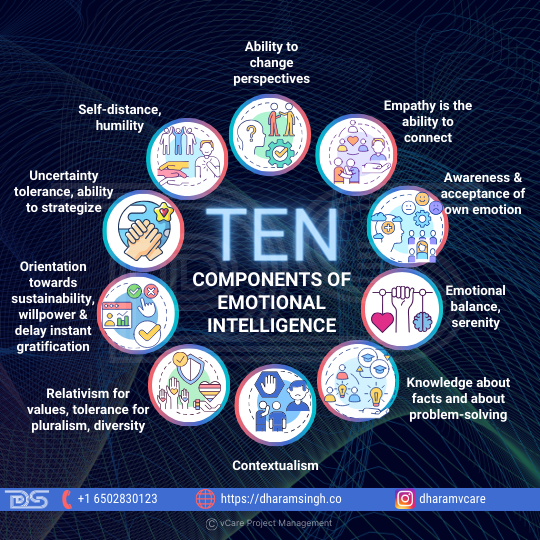
Ten Components of Emotional Intelligence
- Ability to change perspectives – In a bipolar environment, it is possible to remain trapped in one thought and dislike the other viewpoint with strong emotions, which may lead to violence. The ability to look for and identify more points of view implies a shift in viewpoint. Some of the therapies used to treat mental illnesses can help with this. Examples include role-playing, acting, visiting people in various countries, learning about diverse cultures, and brainstorming.
- Empathy is the ability to connect – Understanding people’s intentions, current state of mind, emotions, and mindsets is necessary for being heard, establishing trust, and influencing others. In addition, active listening techniques may help you focus outside yourself and view others as humans who vary from ourselves.
- Awareness & acceptance of own emotions (self-awareness) – Self-awareness leads to increased self-confidence and sincerity. It refers to mindfulness, or being aware of one’s feelings, and is required for self-control and emotional balance.
- Emotional balance, serenity (self-control) – Patience, serenity, and avoiding knee-jerk reactions make you more popular and respected and contribute to mental tranquility. Having a mentor can help you develop and fine-tune this skill.
- Knowledge about facts (know what, assimilation) and about problem-solving (know-how, accommodation) – Wisdom includes knowledge; therefore, it has two components.
- On the one hand, we have factual knowledge about a topic; on the other, we may be specialists in a (typically technical) area. This heuristic knowledge and assimilation are how we apply established systems to circumstances.
- On the other hand, when we encounter new situations or topics, we use accommodation to apply our problem-solving skills. We employ our epistemic intelligence and heuristics to do this.
- Contextualism (consider the situation, timeline, and social relevance) – Even though we have theories and may find similarities in new scenarios, each situation is unique and depends on the circumstances, the context in which the problem develops, and the societal importance. This capacity is achieved via awareness and avoiding picking a solution that works in another context without first examining the present dependencies of the situation.
- Relativism for values, tolerance for pluralism, diversity (which is hard if you are part of the same belief systems for most of your life, like nations and churches) – There are many truths (this is known as non-monism), and yours is only one of them. Others have the right to their realities, which are based on the cultures in which they live, their beliefs and experiences, and the facts to which they have access. Value relativism allows one to accept and appreciate the values of others.
- Orientation towards sustainability, willpower, and delay instant gratification (perspective of linear and circular time flow) – We can pursue long-term goals and make decisions with both short and long-term consequences in mind.
- Uncertainty tolerance, ability to strategize (imaging solutions for scenarios) – Accept that life is unpredictable and swim through it like a river, adapting to currents and waves as they come.
- Self-distance, humility – Do not believe you are the center of the universe, which will remain when you die. Avoid being a taker rather than a giver by avoiding jealousy, bragging, pride, and greed.
Final Thoughts
For today’s project managers, emotional intelligence is a critical concept. Many companies are looking for project managers with strong technical and soft skills. Emotional intelligence is crucial in project management because it enables project managers to improve communication and collaboration in the workplace. It is essential to mention that emotional intelligence can be imparted and nurtured. This aspect implies that as a project manager, one can better oneself by controlling feelings and emotions and developing positive behaviors to influence others at work. One will make better decisions about other people’s emotions, strengths, and weaknesses once they have recognized their thoughts.
Feel free to check out my discussion on this topic with Thomas Walenta in YouTube
For any questions related to your Project Management career, training, and certifications, you can book an obligation free 15 minutes session with me by visiting http://talktodharam.com/
You can subscribe to the vCare Project Management YouTube Channel to catch future videos of our Q&A series and certification success stories: https://bit.ly/2YF0wJl
You can subscribe to and follow my podcasts and interviews with Project Management Experts on YouTube at https://bit.ly/2NDY8wd





















Recent Comments